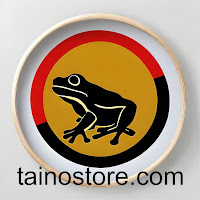
Taino Symbols Many of the Taino symbols were likely lost or destroyed during the period of colonization and the forced conversion of the Taino to Christianity. However, some examples of Taino symbols are: The Zemi, a carved stone figure that represented a god or spirit. The Taíno Sun, which is the sun with a face. The Coquí, which is a small frog that is considered a symbol of good luck. The Areyto, which is a symbol of the Taino's traditional dance and music. The Cemi, which is a symbol of the Taino's ancestor worship.





